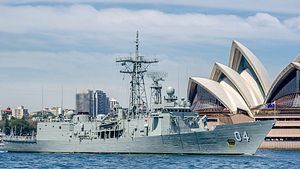In February 2015, Britain’s former spy chief, Sir John Sawers, suggested that the U.K. may need to consider military intervention in North Africa to stem the growing chaos there, including a new wave of violent extremism claiming ties with Islamic State. It is this chaos that prevents governments of Europe from having reliable partner governments in countries like Libya in managing the escalating crisis of boat people in the Mediterranean, abetted by people smugglers.
The last week has seen renewed calls by European leaders to consider the use of military force to destroy the boats used by people smugglers before they can put to sea with their vulnerable human cargoes. The week also saw comments from Australia’s Prime Minister Tony Abbott, to the effect that Europe could learn from his country how to stop the people smugglers and prevent would-be migrants from drowning at sea.
Calling on Europe for stronger border protection policies, Abbott said: “The only way you can stop the deaths is in fact to stop the boats. That’s why it is so urgent that the countries of Europe adopt very strong policies that will end the people smuggling trade across the Mediterranean.”
The use of military force to “stop the boats” and defeat the people smugglers is a tactic that has been used by Australia, but in a quite different way. The Australian navy has been tasked with intercepting the boats on the high seas and towing them back to Indonesian waters, or in some cases, transferring the boat people to detention centers in neighboring countries, such as Nauru or Papua New Guinea.
Human rights groups in Australia, including the country’s Human Rights Commission, have criticized the government policies, especially off-shore detention, but the government claims justification in that the drownings at sea have stopped.
Australia’s Foreign Minister Julie Bishop took a more nuanced position a little later, suggesting that perhaps the circumstances in the Mediterranean were different and that European countries should be left to decide their own refugee and border protection policies. Regardless of the apparent difference of opinion between the two Australian political leaders, the country may have something to teach Europe.
On July 19, 2012, the director general of the Australian Secret Intelligence Service (ASIS), Nick Warner, reported in public on its role in acting against the people smugglers. He said, “ASIS has contributed intelligence and expertise leading to many significant, and unheralded, successes in recent years which have disrupted people-smuggling syndicates and their operations.” Warner added that ASIS “provides unique enabling intelligence for exploitation by law-enforcement agencies.” This announcement was an amazingly open admission of the use of covert assets against the people smugglers.
The southern countries of Europe such as Italy, Greece and Spain, which are the first landfall for most of the immigrants, do not have highly developed forces for such foreign covert action. The more capable countries in this domain, such as the U.K. and France, have had other priorities for their covert action services. It is also hard to imagine how the European Union (EU) could as a group decide a policy in this area where there is no shared competence.
Yet covert action would be eminently preferable to a policy of air or naval attacks on the empty boats of the people smugglers. That form of the use of force is so risky it almost certainly would never be agreed to by the EU. An expansion of Europe’s covert action capability in North Africa would certainly serve other strategic needs of its members better than the proposal of Britain’s former spy chief to consider direct military intervention to restore order in countries like Libya.
This article has previously been published in New Europe.
































